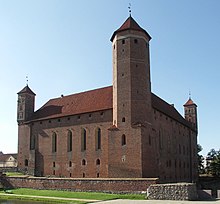Ignacy Krasicki
[H]e was a cosmopolit[e] and owed his imposing literary knowledge to his readings in foreign languages, yet... he was indebted to the mentality of the Polish "Golden Age," and in this respect his admiration for Erasmus of Rotterdam is significant.
Since he was not pugnacious by temperament (contrary to one of his masters, Voltaire), his moralizing, rarely distinguishable from sheer play, [does not show] vitriolic accents.
[3]Ignacy Krasicki was the leading literary representative of the Polish Enlightenment—a prose writer and poet highly esteemed by his contemporaries, who admired his works for their wit, imagination, and fluid style.
Krasicki, the leading representative of Polish classicism, debuted as a poet with the strophe-hymn, "Święta miłości kochanej ojczyzny" ("O Sacred Love of the Beloved Country"), published in 1774.
It was thus a late debut that brought the extraordinary success of this strophe, which Krasicki would incorporate as part of song IX in his mock-heroic poem, Myszeida (Mouseiad, 1775).
In "O Sacred Love of the Beloved Country," Krasicki formulated a universal idea of patriotism, expressed in high style and elevated tone.
Krasicki wrote Listy o ogrodach (Letters about Gardens) and articles in the Monitor, which he had co-founded, and in his own newspaper, Co Tydzień (Each Week).
Krasicki translated, into Polish, Plutarch, Ossian, fragments of Dante's Divine Comedy, and works by Anacreon, Boileau, Hesiod and Theocritus.
[7] Krasicki's major works won European fame and were translated into Latin, French, German, Italian, Russian, Czech, Croatian, Slovene, and Hungarian.
Krasicki has been the subject of works by poets of the Polish Enlightenment – Stanisław Trembecki, Franciszek Zabłocki, Wojciech Mier – and in the 20th century, by Konstanty Ildefons Gałczyński.
[8] The characterizations were not based on reconstructions of individuals from direct observation, but were fictional constructs that reflected society's actual values.
The fables usually find their meaning in the final line, through the symbology of the tale rather than through a complex presentation of ideology, thereby readily conveying even to the illiterate the moral and the Enlightenment ideal behind it.
"[10] However, it is easy to see Krasicki's influence on his contemporaries and on the early 19th century, as in the case of Gabriela Puzynina, a Polish princess, poet, and diarist.
In 1846 she started a newspaper for the intelligentsia of Vilnius and Warsaw, and furthered the establishment of Krasicki's Fables in Poland's suppressed political life.




